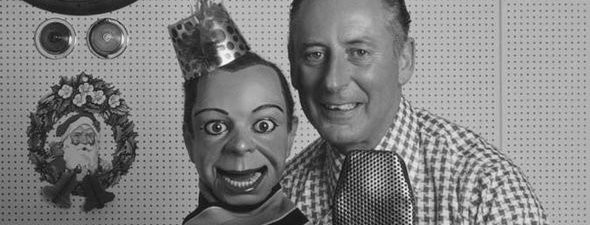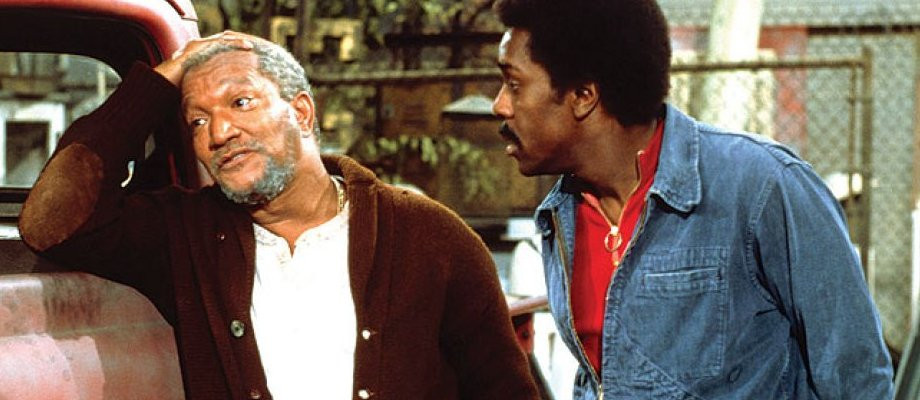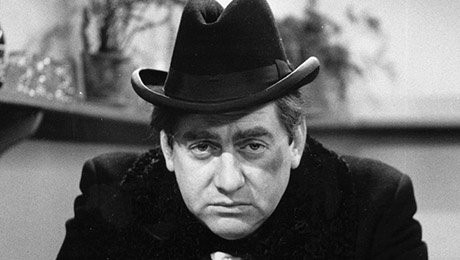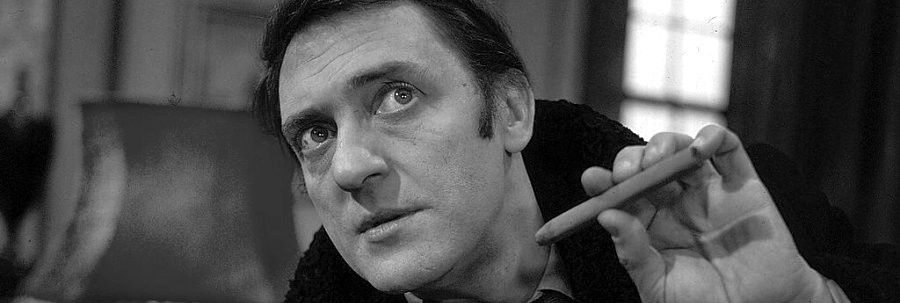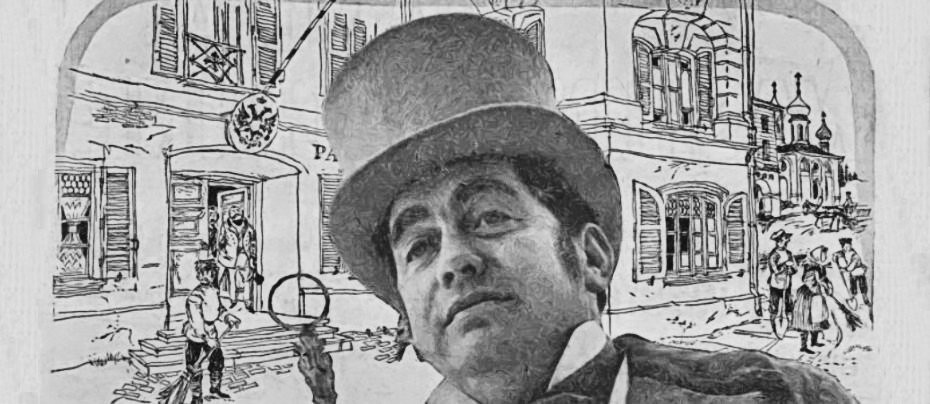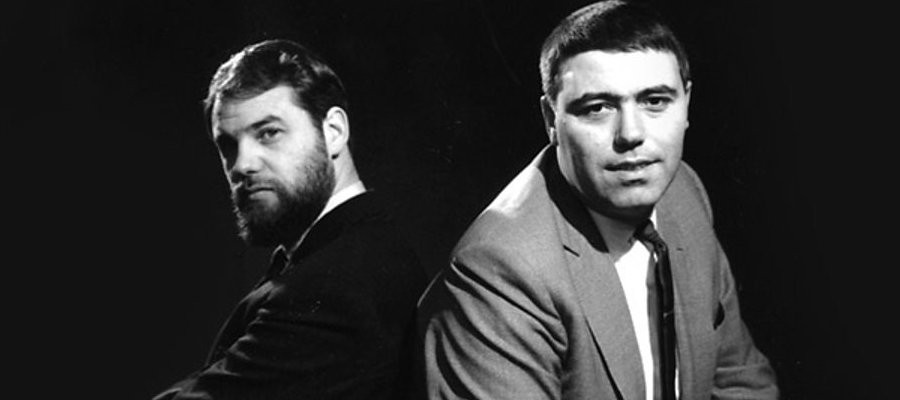
Galton and Simpson
The Annals of British television comedy are littered with a long and distinguished list of writing partnerships whose work has brought moments of warmth and laugher into homes throughout the nation and beyond. But even amongst that illustrious list one particular combination of names which effortlessly commands the respect of their peers - and even more importantly that of the viewing audience itself - towers above all others.
Together, they created the televisual template that effortlessly weaves comedy and bittersweet tragedy into a satisfying whole. Humorous situations wedded to subtlety, deceptively complex and believable characters are their instantly recognisable and cherished hallmark.
They are the undisputed tsars of British TV comedy. Their names are Ray Galton and Alan Simpson, and this is not only their story, but also the story of British situation comedy.

Alan Simpson was born on 27th November 1929, south of the river Thames in Brixton. By the age of 19 he was working in a mundane job as a shipping clerk when he contracted tuberculosis. Ray Galton was born in Paddington on 17th July 1930, and by 1948 was working for the Transport and General Workers Union when he too contracted the killer disease.
During World War II and its aftermath, disease rates had soared among weakened populations. In particular, forms of tuberculosis - a disease which two hundred years ago was the greatest killer the country had ever seen - were widespread. In the early 1950s, there were thought to be around 20 million cases worldwide. In England and Wales around 50,000 cases a year were being reported. This painful condition, spread by a micro-organism, thrived in crowded and unsanitary conditions in many areas of the UK, and could lead to total disability, and in many cases those who were infected were not expected to survive.
Treatment, when available, was admittance to an isolation hospital, and might take up to three years. In 1948 Ray Galton was admitted to the Milford Sanatorium in Surrey, where the other patients were mainly older men straight out of the armed forces. Some time around August, Ray was laying on his bed in a small four-cubicle room when Alan Simpson walked past. "When Alan went past, the room went dark, because he was a big man - about 6ft 4in and 18 or 19 stone. I saw this shuffling figure with a big brown dressing gown on, with the collar turned up, going by swinging his toilet bag on his way to have a wash. I thought, "Who the hell's that?", because you expect everyone in a sanatorium to be thin and weedy, and he was the biggest guy I'd ever seen."
As the hospital staff liked to keep patients of a similar age together, Alan was soon moved into the same cubicle as Ray. Another who shared the space with them was Tony Wallis, a skilled electrician and something of a radio buff, which proved to be quite a relief for Alan and Ray. Up until then the only form of entertainment for them was a radio which could only tune into one channel. Although it was strictly against the rules, the staff allowed Tony to rig up his own receiving equipment utilising an RAF eleven-fifty-five radio from a Lancaster. By the time Tony had finished every patient had the choice of the BBC Home Service the Light Programme and the hospital's own radio station.
Alan and Ray listened avidly to all the comedy shows and Tony managed to tune into another network, probably a forces one, where they heard US comedy shows such as The Phil Harris Show and The Jack Benny Show as well as more obscure (to British listeners) shows such as Duffy's Tavern, Ozzie and Harriet and The Great Greensleeve. These were all formats that were deemed unsuitable by the BBC.
Not content with stopping there, Tony Wallis was allowed to convert a broom cupboard into his own studio and soon the patients formed their own radio committee to decide on the type of shows they wanted to broadcast. These were mainly copies of BBC shows and also included record requests, with music supplied courtesy of the hospital charities. Then Alan and Ray offered to write six 15-minute comedy shows, and the committee accepted. The shows were a satire on hospital life and proved popular with both staff and patients, although after just four shows the material dried up.
Seeking encouragement and advice on writing comedy elsewhere, Alan and Ray decided to write to the BBC for their help. One of their favourite home-grown series at this time was Take It From Here starring Jimmy Edwards and Dick Bentley. The writers were Frank Muir and Denis Norden and that's whom Alan and Ray decided to address their letter to. In reply they were told to send any material they had to the BBC's script editor, Gale Pedrick, who was always on the lookout for new talent. However, Alan and Ray didn't do much writing together following their brief hour of comedy and about a year later both men had sufficiently recovered to be allowed home from the sanatorium. Alan went back to work but Ray, who was let out four or five months after him, was still too frail to return to work. The pair continued to see each other socially but didn't write together again until an amateur church concert party, where Alan had been a member during his teens, approached him and asked if he had any material they could use. Alan asked Ray for his help and the two men got together at Alan's mother's house for some evening sessions in which they put together a number of topical sketches. At that time they also laid down the format for their future partnership, with ideas being thrown backwards and forwards until they both agreed on a line. Only then would it be committed to paper and it was Alan Simpson who did the actual writing.
Having started working together again, Alan and Ray wrote a sketch based on the last segment of Take It From Here, which was usually a spoof of something popular at that time. It was a ten-minute sketch, their target was Captain Henry Morgan, the 17th century privateer, and having remembered the advice they got from Muir and Norden they sent it to Gale Pedrick. Ray and Alan remember: "A pirate sketch seemed ideal for Joy Nicholls, Dick Bentley and Jimmy Edwards and Henry Morgan seemed the ideal subject matter. The whole purpose was to give Gale Pedrick, the script editor at the BBC a sample of what we could write."* Within a few weeks a reply came which said: "Don't read more than appears on the surface of this letter but we read your script and were highly amused. Make an appointment with my secretary and maybe I can point you in the right direction." When Alan received the letter he made his way over to Ray's house and the two of them got drunk. "We showed all our friends that letter and even if nothing else had happened, we would still be showing that bit of paper to people saying, 'Look, we nearly made it.'"
They made an appointment to see Pedrick as instructed, and found him to be very helpful. Even though he could not promise any immediate commissions he circulated the script for them and put them in touch with a few producers. One of these was Roy Speer. The script was left on his desk while he was producing a show called Happy Go Lucky starring Derek Roy, who in 1951 was a big star on radio along with Frankie Howerd. Derek happened to be in Roy Speer's office one day and picked up the script and started reading. He said, "Who wrote this, because there is some good stuff here?" Before Roy had finished reading the first page he asked Speer to call the young writers up to Broadcasting House for a meeting. Galton and Simpson were duly called up and on meeting Derek Roy came to an agreement whereby they would write jokes for him. For every one he accepted they would be paid five shillings. They returned to Alan's mum's place and bashed out a bunch of one-liners, which they describe as being very much in the Bob Hope style. They would take them round to Derek's flat where he would go through them one by one and say "Yes, yes, no, yes, no, no, yes, yes," then call his secretary in and say "five". Out would come the cash box and they were paid their 25 shillings or whatever it amounted to, and they'd go away and split it. As far as Galton and Simpson were concerned, this now made them professionals.
Despite its title Roy Speer's show was neither happy nor lucky. The show was conceived by Jim Davidson, who at that time was head of variety at the BBC. It was written as a vehicle for Derek Roy because he'd never starred in his own series before and it was felt that he deserved a chance. It also featured a number of up-and-coming comedy stars such as Graham Stark, Bill Kerr, Peter Butterworth and a comedian making a real name for himself, Tony Hancock. Speer was struggling to find writers. In spite of Derek Roy's admiration for Galton and Simpson, he was reluctant to give a 50-minute sketch show over to two new and untried talents. But the show was a complete flop anyway. During the 13-week run the pressure on Speer became increasingly unbearable. He was even accused of deliberately trying to sabotage the production because the BBC management had suggested it. There were also totally unfounded accusations of the producer taking bribes from agents, and all this led to Roy Speer having a nervous breakdown before the end of the series. There were still three weeks to go when Speer's departure was announced. The man put in charge for those last shows was Dennis Main Wilson. The first thing he did was sack all the writers - except for Galton and Simpson. "He came up to us and said, "You two tall blokes, are you writers?" And we said, "Yes", so he said, "all right, you write the show." We said yes even though we didn't think we could do it, because we knew if we had said no, we'd have been finished. Our only saving grace was that the show was so bad that it couldn't have been any worse." They were paid forty guineas a show and on the day the first cheque arrived Alan Simpson quit his office job and bought a typewriter.
The final Happy Go Lucky was recorded at the Playhouse Theatre in Lower Regent Street, London. It was here that the writers had their first conversation with Tony Hancock. As they were leaving the theatre the star came up to them and making reference to a sketch they had written about a children's party said; "Did you write that sketch?" They nodded. "Very funny," said Hancock walking away. "Very funny." And the seeds were sown for the future of British comedy.
A few weeks later, Hancock telephoned Galton to ask if they would write single five-minute sketches, which he could use on various variety shows. He offered them half his fee. It proved to be a very generous gesture: for his next show he earned £50.00 Just as importantly, Galton and Simpson were now growing in reputation within the BBC. They were offered the chance to write the last six shows of a series called Calling All Forces which up until then had been done by the writing team of Bob Monkhouse and Dennis Goodwin. Calling All Forces was the biggest Radio show on the air, but the gruelling schedule had left Monkhouse and Goodwin exhausted and in need of a well-deserved holiday. Tony Hancock, meanwhile, was playing second banana to Charlie Chester. After these six shows the BBC, impressed by Galton and Simpson's scripts, decided to continue the series under a succession of names, firstly Forces All-Star Bill and then All-Star Bill and finally Star Bill. It had a different guest comedian every week, but Tony Hancock was now the star. "It ran for another two or three years," says Alan Simpson, "by which time we had written for every comic in the country. We were still in our early 20s at this time, but we were getting known within the business. So much so that Spike Milligan asked us to form a company called Associated London Scripts with him and Eric Sykes."
Dennis Main Wilson, who had given Galton and Simpson their first chance to write a full radio show by themselves, was also the producer of Star Bill. Main Wilson had also produced the legendary Goon Show and would become one of the most influential people in the entire history of British situation comedy. Galton and Simpson approached him and asked if they could do a half hour show with Tony, rather than the sketch show. "We wanted to do a storyline all the way through that was character based. We were adamant we wanted no jokes or silly voices. And unlike The Goon Show and so many others of the time, we wanted no musical breaks." It was a concept that was totally new. Main Wilson, who was 29 at the time and was very open to new ideas, thought it was a great chance to do something completely different. On 1st May 1953 Wilson sat down and wrote a memo that would change the course of British situation comedy forever. 'I believe', he wrote 'we can entertain most of the people, most of the time, without having to drop our sights - either intellectually or in terms of entertainment.' This thirty-minute situation comedy would follow the misadventures of a central character and his associates, based on reality and truth as opposed to jokes, 'merry quips and wheezes'. When his memo arrived on the desk of the BBC's head of variety that same afternoon it sparked weeks of debate. Many doubted the viability of a show so far removed from the accepted format that Main Wilson was forced to submit further memos over the ensuing weeks. 'The comedy style will be purely situation in which we shall try to build Tony (Hancock) as a real-life character in real-life surroundings. There will be no 'Goon' or contrived comedy approaches at all.'
On Tuesday 2nd November 1954, at 9.30 pm the British public were treated to the first Hancock's Half Hour. Teamed with Sid James and Bill Kerr that first Hancock show also gave a break to another comedy performer on his way to immortality, Kenneth Williams. An Audience Research Report for the show indicated that it had attracted 12 per cent of the adult population - 13 per cent down on The Al Read Show, the series that had previously been broadcast in the same slot. However, it proved good enough for the BBC to decide to continue with the first series, but without commitment to a second one. The first series of Hancock's Half Hour ended on 15th February 1955 with ratings climbing steadily. A second and third season were subsequently ordered, with the BBC confident enough in their star and his writers to commission twenty episodes for season three. Each script was conceived, written and then delivered within a week: a furious working pace. It was also during this series that Hancock's legendary home of 23 Railway Cuttings, East Cheam, was established. By the end of that third series the BBC were facing competition from their first television rival. ITV had begun broadcasting in September 1955 and the BBC was desperate to come up with new TV material in what was the beginning of a hot ratings war. ITV were also doubling all the BBC's wages and the Corporation was in danger of losing Hancock at one stage. Around this time Hancock was under contract to Jack Hylton to do a stage review, which he didn't want to do. When he tried to get out of it Hylton would only agree on condition that Hancock do a television series for him at ITV. Eric Sykes was the writer for this series but as good as Sykes was, it was only really Galton and Simpson who knew how to get under the skin of the persona they had devised for Tony. Tony asked them to write the last three episodes but they were under exclusive contract to the BBC who flatly refused to allow them to write for their rival. When it was pointed out that it was in the BBC's best interest that Tony have a successful series, because a flop on ITV would only harm his reputation, they relented and let them write the episodes as long as they didn't take a credit for them. Free of his contract, Hancock able to return to the BBC. "The only problem was," says Alan Simpson, "ITV had doubled our money, so the BBC had to match it. From then on we never looked back."
Reaction to Hancock's first BBC series was decidedly cool. Even though around 56 per cent of the British television-owning public tuned in, many felt that the transition from radio to television was 'disappointing'. However, ratings climbed steadily and a second series was commissioned. Over the next three years Hancock's Half Hour became the yardstick by which all other British sitcoms would be measured for decades to come. After the sixth radio series Galton and Simpson scripted a movie for Tony Hancock called The Rebel. "Tony got it in his mind that he had to get away from the double act that everyone perceived with him and Sid." says Alan Simpson. Sid James didn't have to rely on Hancock. He was doing up to ten films a year, but in the public's consciousness they were always together and Hancock was troubled by this. "Tony did not want it to turn into a Laurel and Hardy. He also wanted to be big internationally, which he got a taste of by doing The Rebel, and working with George Sanders. Following this taste of 'going it alone' Tony decided to drop Sid James for what turned out to be the last BBC TV series. He wanted to get as far away as possible from the image that Galton and Simpson had built for him. "This meant getting him out of East Cheam, losing the Homburg hat and getting rid of Sid. We also got rid of the half hour and just called it Hancock. People used to say that he was never the same after Sid James left, but four of the episodes in that series were the most famous we ever did," says Ray Galton. "You ask people to name any Hancock episodes and they will usually say The Blood Donor, The Lift, The Radio Ham, The Bowmans."
The series had immense pulling power and many pubs complained that customers would stream out twenty minutes before the broadcast of the latest 'Hancock' to ensure that they got home in time and were comfortably in front of the television before the show started. By the time the series finished, on 30th June 1961, one in three of the television-watching adult population had tuned in to what was the final chapter of a comedy era. For Tony Hancock would never rise to such heights again. Galton and Simpson, on the other hand, would.

The beginning of Hancock's decline was seen by many as the result of a car crash just a few days before he was due to shoot what was to become one of his best loved and easily remembered shows of all time; the Hancock episode entitled The Blood Donor. In the crash Hancock suffered concussion after his head shattered the windscreen of the car his wife had been driving, and for the next few days he was unable to learn his lines. Ray Galton picks up the story of what happened next: "The BBC had the choice of postponing the show or doing it with idiot boards (prompt cards). Tony decided to do it with the idiot boards, and it came as such a relief to him, not to learn half an hour's script, that it stayed with him and he never learned another line after that."
Alan Simpson claims that if you watch Hancock in The Blood Donor it's very obvious, even though nobody noticed it at the time. "It got worse years later when he went on to do other shows on ITV. John Le Mesurier told us on one show he wasn't even turning up for rehearsals. They would block it with a stand in, and he would come in for the recording. His face would be just like a mask with no expression. But Hancock's performance was all about his expression, his timing and his reactions. He was a reaction comedian. We did a few of the old shows for audio records towards the end. In the studio a 28-minute show lasted 40 minutes because his timing had gone. So we had to cut the pauses out ourselves when we came to edit it. We were doing his timing for him."

Before writing this series for Hancock, Galton and Simpson created a sitcom for Sid James at the request of the BBC, which was desperate to keep the star that Hancock had so unceremoniously dumped. The series was called Citizen James and in their outline Galton and Simpson described the character, Sidney Balmoral James, as a 'self-employed man of about forty-something summers and very hard winters. His face bears testimony to a difficult life, careworn, craggy and worn'. The character was described as a 'parasite', 'public enemy', 'evil to society', but 'not a crook'. Alan Simpson claims that all they did was take Sid's character out of Hancock and put him straight into his own series. "It was exactly the way we had been writing for Sid for the Hancock shows", he said. "We just took Sid away from Hancock so he could carry on working on his get-rich-quick schemes." Citizen James ran for 33 episodes between 1960 and 1962, although Galton and Simpson only wrote the first series.
Following his solo series Hancock was now thinking of turning his attention away from television. Having got a taste for the big screen, and having enjoyed a good deal of success with it on the home front, he now decided he wanted his next film to aim for the international market. To pave the way for this change Hancock gave an interview to the Evening Standard newspaper in which he claimed that he had gone as far as he could with the BBC and was switching to Independent Television. It came as a surprise to Galton and Simpson when they read it, because Hancock had made no mention of it to them. In spite of Hancock's thoughtlessness he still saw his future very closely tied to the two writers; at least, that's what he told the Sunday Telegraph: "Ray Galton and Alan Simpson and myself, after six years together, are very close both professionally and in every other way." And of their future he said: "We are going to do four or five films with ABC. We haven't got the story for the next film yet, but as with the television series, we're moving away from plot - at least plots that bind you down too much. We intend to have a story out of which emerge high spots of comedy."
Hancock's words disguised the full story. Galton and Simpson had moved into Hancock's home and had begun discussing various ideas for the next feature film. One of them, about a Punch and Judy man, was rejected as it was felt the movie lacked the international appeal that the comedian was looking for. Eventually, all three agreed on a plot about an idle young man and his three brothers, all of whom had become successful businessmen. The idle son had enjoyed an easy life thanks to the generosity of his father. But when the father died, the son had to go and work for each of his brothers. With the plot agreed, Galton and Simpson returned to their office and set about writing the screenplay. But about a third of the way through, Hancock phoned them up and said he'd gone off the idea, using the excuse that this story also did not have international appeal. The writers agreed to go back to Hancock's Blindley Heath home for another brainstorming session and by the time they had returned to their office it had been agreed they would write a script set on a cruise liner, on which Hancock would be a passenger. There would be no fixed plot; Hancock would simply react to a number of different situations that arose during the cruise. Galton and Simpson had almost completed the script when Hancock phoned them up again and cancelled it. His reason this time was that the film would be too much like Monsieur Hulot's Holiday.
A third script was ordered by Hancock. This one was called The Day Off and revolved round the mishaps that befall a man on his day off from work. Galton and Simpson were two months into the project when the inevitable happened; Hancock went cold on the idea. This time, Galton and Simpson weren't just a little put out: they were downright livid. Apart from the fact that Hancock hadn't read one word of the script, Galton and Simpson had been working on various scripts now for six months and hadn't earned a penny. To add insult to injury Hancock now decided he wanted to go back to the original idea of the Punch and Judy man story. Ray Galton told him: "It's hardly international Tony, set in a wet winter in Bognor". Nevertheless, Hancock wanted to return to the original idea. Galton and Simpson stood their ground this time and told Hancock that they had to start earning a living again. In response Hancock simply told them; "Well you go and write some television and I will work on the Punch And Judy idea with Philip Oakes". In fact, it's now known that Hancock had already begun collaborating with Oakes before that meeting Galton and Simpson. Privately, Hancock had convinced himself that Galton and Simpson had failed to 'grow' with him and were too stuck with the persona they had created for him on radio and television - the one that had made him a major star. It all came to a head when Hancock called a meeting with the two writers and his (and their) agent, Beryl Vertue. The party arrived at Hancock's house, but didn't stay very long. "I've decided I don't want to do any more programmes with you" he informed Galton and Simpson. And before anyone could comment he rounded on Vertue and told her "And because of your involvement with Ray and Alan, it would be too embarrassing for you to look after me." In one fell swoop Hancock dismissed both writers and agent, deciding that his future would be much brighter without them. He was wrong. The BBC's reaction is revealed in a memo sent by Tom Sloan, the head of Light Entertainment, to his bosses:
"His (Hancock's) loss is greatly regretted, but one must remember he will be without his producer (Duncan Wood) and his scriptwriters (Galton and Simpson) and Sidney James. The result could be unfortunate.
Tom Sloan was spot on.
What the BBC did decide was that they had far more valuable assets in Ray Galton and Alan Simpson and they immediately took steps to ensure they hung on to them. Tom Sloan called the boys to his office and asked them what they wanted to do next. They told Sloan that they wanted to write for Frankie Howerd. Alan Simpson: "He was a great mate of ours and we thought he was wonderful. Tom said, "No, no, no you can't do that, he's finished, his last series was terrible". We said it wasn't Frank, it was the scripts. But he got out all these graphs to show ratings and what-have-you and said, "I don't want you to do that. I have got ten half-hour slots available and I have a title". He went on to make us an offer that had never been made to anyone before or since. He said, "That's yours, you can do what you like with it. You can write what you like, cast it, be in it, direct it, anything." We couldn't turn it down."
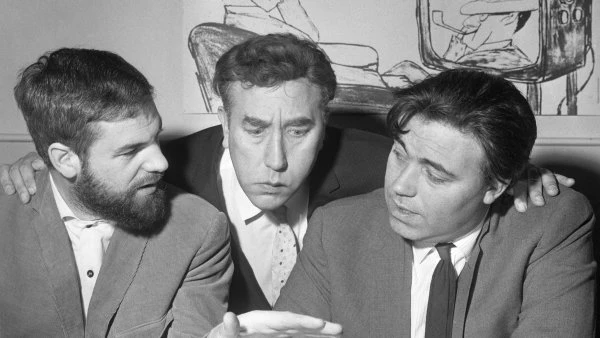
However, Hancock was not completely out of the writers' lives yet. A year or two later they wrote a musical based on the play Noah by Andre Obey with music by Leslie Bricusse, which they planned to make with Harry Secombe. When they showed it to Bricusse he said that it would be perfect for Hancock. The writers pointed out that Hancock could neither dance nor sing and by that time his health wasn't too good, either. Undeterred, Bricusse showed the script to Hancock who was very taken with it. Hancock said he was going to start taking singing and dancing lessons and even orgaised a big reconciliation press party. "But he didn't turn up until after it was finished, pissed" said Ray Galton. Then Leslie Bricusse went to Hollywood to write Dr Doolittle, Noah was shelved and never resuscitated. "And thus ended our relationship."
On 24th October 1961, the BBC confirmed acceptance for the new Galton and Simpson series, Comedy Playhouse. The first show starred Eric Sykes and Warren Mitchell in a tale of a French undertaker who goes about creating a market for his skills. It was called Clicquot et Fils. But by the time the boys sat down to write the fourth episode they discovered they had run out of ideas. Alan Galton remembers how they got the idea for episode four. "We had to use a technique we had when we couldn't think of anything, we'd start by saying, "Two...something or others" - two rat catchers in Buckingham Palace or whatever. Ray said, "Two rag-and-bone men walking down the street..." The duo recalled how they had once been in an eel-and-pie shop in Shepherds Bush where they had overheard some slang being used by two men sitting at a nearby table. It turned out that they were rag-and-bone men, also known as 'totters'. They thought it would be a good idea to write a comedy using such characters, but soon forgot about it.
They had in fact written about a totter in an early episode of the Hancock radio series called The Junk Man. Alan Simpson was not convinced they could sustain a 30-minute sitcom using these two characters. But, necessity being the mother of invention, the pair began to write dialogue for the two rag-and-bone men, and as a plot began to develop it became quite clear to them that one of the men would be much older than the other, too old and too frail to go out to work so he would stay back at the junk yard. Looking for more motivation as to why the two characters would stay together they hit on the idea that they had to be father and son. They went back and revised the dialogue, adding a lot of pathos, something not really tried before in a sitcom.
They discovered that given the situation the characters found themselves in, the dark undercurrents were an intrinsic part of the plot. Living a claustrophobic existence, the two men had come to resent each other over a long period of time. The father is a lazy, mean skinflint of an old man with questionable hygiene habits while his son is a social snob who has delusions of grandeur. A self-appointed connoisseur of fine wines, which he has collected over the years from abandoned bottles, he is continually telling his father that one day he will leave to pursue a career more befitting his intelligence and 'breeding'. The family business, Steptoe and Son, will have to do without him. In the script for this particular Comedy Playhouse episode, The Offer, the son has been offered the chance to leave the business for another firm. When the old man's pathetic attempts at emotional blackmail fail he becomes bitter and begins to rubbish his son's chances of making a better life for himself. The son gathers his meagre possessions together as he attempts to leave but in a final act of defiance the old man refuses to lend him their horse to pull the cart that contains his belongings. Determined to break away the son grabs the cart himself and vainly tries to push it out of the firm's back yard gates, but it is too heavy for him. He breaks down and sobs "Got to get away..." and at that point the viewer knows he never will.
For the casting of this episode the writers made it quite clear that they wanted to employ dramatic actors rather than comedians. Their first choices were Wilfrid Brambell as the old man, Albert Steptoe, and Harry H Corbett as the son, Harold. The actors had worked together before, in 1959, in a televised play called The Torrents of Spring. The writers chose J G Devlin as Albert and Ronald Fraser as Harold, should either of their first choices prove to be unavailable. Wilfrid Brambell was the first to accept, with Corbett following suit shortly after.
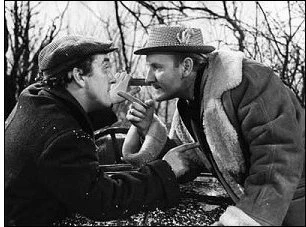
This example wasn't the only time the writers were stuck for a plot. On one occasion they'd spent a whole week trying to come up with a half-hour for Comedy Playhouse. They were desperate for an idea when the actor Graham Stark came to visit them at their office of Associated London Scripts. As the boys poured him a drink Graham told them of a funny story he'd read in the Evening Standard a day or two before, about two cars going down a narrow country lane somewhere in Cornwall. It wasn't a long piece in the paper, just a few lines about how neither driver would give way to the other. The boys were so inspired they sat down and wrote Impasse in just two and a half hours. The show was cast with Leslie Phillips and Bernard Cribbins as the two drivers who refuse to back up a narrow country lane when they meet head on, with the added edge of one driving an old jalopy and the other a Rolls Royce. In typical Galton and Simpson style the show wasn't just a comedy about two pig-headed motorists, it was a social comment about the class system that was still so prevalent in the UK.
While Tom Sloan was watching the rehearsals for The Offer he said to the writers, "You know what you've done here don't you. You've got yourselves a series." But having just done a ten year stint on Hancock the last thing they wanted was to get tied down to another situation comedy. In spite of the fact that the boys declined the offer Tom Sloan was convinced they would change their mind. He kept on at them throughout the rest of the Comedy Playhouse series until eventually they said they'd only do it if Wilfrid Brambell and Harry H Corbett agreed to do it, too. Ray Galton says he never thought they would, but when it was offered to them they both jumped at the chance to make another five episodes.
A revised version of The Offer was shown on Thursday 7th June 1962 as a prelude to the complete series now to be called Steptoe and Son. The only real change was the music Old Ned by Ron Grainer replacing his original Comedy Playhouse theme (Happy Joe), and new opening credits. By the time the series was halfway through transmission Galton and Simpson had gone on holiday to Spain. They were amazed when after a few days away they were joined by Harry H Corbett, who told them that the show was a massive success and the BBC was already keen for a further series of six episodes. If Hancock had set the format for British situation comedy then Steptoe and Son set the benchmark by which all that followed would be judged. The series won Galton and Simpson the Writers' Guild Award in 1962 and 1963. With viewing figures of well over 20 million, Steptoe and Son established itself in the nation's heart and consciousness.
But after the second series Wilfrid Brambell dropped a bombshell on the BBC when he told them he wouldn't be available for a third series. He had been cast in a big New York musical that was predicted to run for two years. Alan Simpson says they had to decide whether to pull the series or wait for Brambell to come back. In the end, they decided to kill him off. "The BBC didn't want the show to end, so Ray and I came up with the idea that we would start off series three with his funeral. Then there would be a knock at Harold's door and a young lad would say, "My mum says that I'm your son." So it would be Steptoe and Son moved down a generation. Harold would have adopted all the habits that the old man had, like saying "What time do you call this?" when he came in at night. We were going to ask David Hemmings to play the young man, because he was about 21 at the time." In the meantime, Wilfrid Brambell's show opened in New York - and closed the same night. He came back and said "I'm available for series three." According to Ray, "We never put pen to paper in regard to killing him off. It was just an idea we had." The series continued to be hugely successful to the point where in 1964 the British Prime Minister, Harold Wilson, was so concerned that Labour Party supporters would be distracted from voting in the General Election he asked the BBC to delay the transmission of an episode until after the polls closed.

A year before that the boys got to work on another classic British comedy for the big screen. The Wrong Arm of the Law wasn't their film to start with. It was written by Les Heath and John Warren. But the producers were not entirely happy with the script and asked Ray and Alan to alter it slightly by adding some new gags and set pieces. Alan Simpson says they rewrote it. "We didn't ask to, but as these things go along, they ask you to do a little bit more, then a little bit more. So in the end it was a complete rewrite." This meant that the boys were now working with another actor who had a reputation of being notoriously difficult. Peter Sellers couldn't make up his mind whether he wanted to play the policeman or the head of the gangsters, who fronts a ladies' dress shop in The Wrong Arm Of The Law. After a couple of days' rehearsal, he decided he was going to play the policeman and then changed his mind, electing to play the villain, Pearly Gates. As shooting commenced Peter asked if it was too late to change his mind. So he was now again playing the policeman, the part ultimately played by Lionel Jeffries. A week into shooting Peter went up to Lionel Jeffries and said; "I've cocked it up. I'm playing the wrong part."
Sellers was very taken with the rewritten script for The Wrong Arm Of The Law and talked the boys into writing a film just for him called The Spy with a Cold Nose. They took the first draft down to Peter's home and as he started reading it he fell about laughing. "Right, he said, I don't need to read any more. We'll produce it ourselves. I'll book the studio tomorrow morning, I'll arrange a producer, and we'll form our own company." Galton and Simpson thought this a wonderful opportunity for them but a week went by and they never heard anything from Sellers. Finally they got a phone call from Sellers' representative to say: "Peter sends his regrets, but he can't do the picture, he's agreed to do a film with Woody Allen, What's New, Pussycat. He wishes you all the best with the film." The film was made in the end and starred Laurence Harvey and Lionel Jeffries who played more or less the same sort of part he'd had in The Wrong Arm Of The Law.
The following year the boys finally got their wish to write a full series for Frankie Howerd. Also in the mid 1960s, Galton and Simpson were invited to Hollywood to work on the screenplay for a movie called Pieces of Eight, which was set in the year 1690 when the Port of Spain was hit by a flood. According to Alan Simpson the producer wanted to make it in the style of a James Bond movie. Bond had only been on screen a few years but was already a major success, and one of the things the producer wanted was gadgets. He wanted James Bond-type gadgets that would work in 1690, and he also wanted to up the comedy content of the film. He'd hoped to talk Michael Caine and Diana Rigg into taking the leading roles. The boys were in America for two months but in the end the film was dropped by the studio in favour of Thoroughly Modern Millie. It was never referred to again.
By 1967, it seemed as though Steptoe and Son had reached a conclusion, and the BBC repeated almost every episode of the four seasons 1962 to 1965. The format sold extensively abroad and the boys' scripts were adapted in many languages. In 1972 the series was adapted for US television as Sandford and Son. But the series should have been made three years earlier. "We spent two months writing a pilot." Said Alan Simpson. "But they couldn't cast it. They said it was too ethnic and didn't know where to set it. We can't set it in New York - they'd be Italian or Jewish. We can't set it in Chicago - they'd be Italian, too. We can't set it in Los Angeles, they'd be Mexicans. So it's a bit of a problem, really. The boys suggested they do it with an all black cast. "They said, "that's a wonderful idea but if they are poverty stricken the network won't wear it. Black people have to be doctors or lawyers." So we came home. Three years later we got a call asking if we would have any objection to them doing Steptoe with a black cast. We said, "Not only have we got no objection, but we suggested it three years ago!" They said, "Well, three years ago you couldn't do it, but you can now."
Back in the UK, Galton and Simpson were lured to LWT to do a series called The Galton and Simpson Comedy. The first episode, The Suit starring Leslie Phillips as a womanising company boss who finds his clothes are stolen in a burglary while he is in bed with his secretary (Jennie Linden) was later the launch for another BBC sitcom called Casanova '73. They wrote six episodes of The Galton and Simpson Comedy for LWT as well as a couple of specials for Frankie Howerd before returning to the BBC where they wrote a new series that was a co-production between the BBC and Bavaria Atelier of Munich. The series was set in a small French village and was called Clochemerle. Adapted from a novel by Chevallier, written 40 years earlier, the tale dealt with the ridiculous repercussions that followed the erection of a gentleman's public convenience in the very centre of the village of Clochemerle. It starred Peter Ustinov as the narrator, and Cyril Cusack, Roy Dotrice, Wendy Hiller, Kenneth Griffith and Bernard Bresslaw.Also around this time the BBC approached the boys and asked them if they'd consider reviving a number of Tony Hancock's scripts for a series starring Arthur Lowe (in the Hancock role) and James Beck (in the Sid James role). They did one show called The Economy Drive but soon afterwards James Beck died. Arthur Lowe refused to go on, convinced that further disaster would befall him. "Hancock's gone, Jimmy's dead...these things go in threes, you know" he told the boys. That one show has never been seen.
But there were more Steptoes to come. In the early 1970s the BBC revived a number of its early sitcom successes of the 1970s. Shows like The Likely Lads and The Liver Birds were brought back and seen in colour for the first time. Steptoe was the most successful of these revivals and the new run (which finished in 1974) produced some of its most classic episodes ever such as Porn Yesterday and The Desperate Hours which featured Leonard Rossiter and JG Devlin, Galton and Simpson's second original choice for Albert Steptoe. In 1972 the boys took Steptoe and Son to the big screen where Harold finally gets the girl, marrying a stripper but having to take his father on their honeymoon, with disastrous results that end up in possibly the quickest marriage in sitcom history. The following year Steptoe and Son Ride Again was produced for the cinema although the second film was not as funny as the first and the two rag-and-bone men seemed to suffer a similar fate to many half hour sitcom characters who were transferred to the silver screen. In 1974, Galton and Simpson wrote a single comedy for Les Dawson entitled Holiday With Strings. It proved successful enough for Yorkshire Television to commission a further seven scripts under the title Dawson's Weekly. The same TV company also revived the Comedy Playhouse strand, giving it the title Galton and Simpson's Comedy Playhouse. The last of these was transmitted on 17th March 1977, and after this Alan Simpson decided to retire.
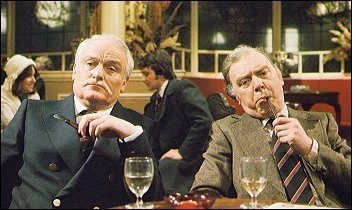
Ray Galton teamed up with Till Death Us Do Part writer Johnny Speight and together they came up with a comedy set in a small Metropolitan Police station, called Spooner's Patch. That same year (1979) they also wrote the pilot for another comedy series, The Tea Ladies, which starred Dandy Nichols, Mollie Sugden and Patricia Hayes. In spite of a promising pilot the series was never commissioned. Ray began another collaboration in 1986 with John Antrobus for an exaggerated account of media life, in the Yorkshire Television-produced Room At The Bottom. The show ran for two series. In 1996 Galton and Simpson reunited to update some of their older scripts from Comedy Playhouse and Hancock so they could be remade by the comedian Paul Merton. Alan Simpson remembers meeting Merton and immediately being impressed by his enthusiasm. "It was a great opportunity for us to work with one of the best of the new generation of comics." Of the Hancock scripts they decided to redo they decided they'd leave alone such classics as The Blood Donor. Even so, Ray Galton remembers telling Merton "You do realise that you're on a hiding to nothing here?" knowing full well that his performances would instantly be compared to one of Britain's best loved comedic actors. "People were always going to say, "Who do you think you are, doing this?"" Galton says it may not have been a critical success, but they were grateful to him for doing it. As for Merton, he reckoned the advantages outweighed the disadvantages when he said, "Even if it was a disaster at least I could say I did it - I worked with Galton and Simpson."
In recent years there has been renewed interest in Galton and Simpson's work as well as the stars they wrote for. Recently, the BBC re-evaluated the series Comedy Playhouse in a two-part radio documentary. However, some TV shows were not always to the boys' taste. A dramatisation of the life of Tony Hancock starring Alfred Molina was inaccurate in many details in spite of the fact that the writer, William Humble, came to see the boys first for advice. Apparently he then went away and created situations that never even happened. Ray Galton said it was a travesty: "When we saw the show we were appalled. For example when Tony booked The Festival Hall to do a one-man show, we had refused to go. But Humble put us in the audience. Apparently it got so bad that he started doing The Blood Donor on stage, then you get a shot of Alan and me looking at each other while Hancock was dying a death, sneering and saying, 'He thinks he's God'. It was a complete fabrication."
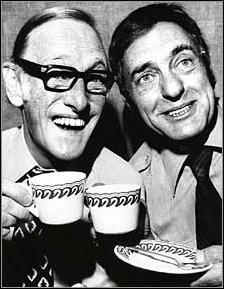
A similar thing happened when Channel 4 made a thoroughly scurrilous documentary about the relationship between Wilfrid Brambell and Harry H Corbett. They were interviewed by a researcher for the show (When Steptoe Met Son) who made it quite clear that they wanted to dish the dirt on the two late actors. The boys told them they were not interested in this type of venture. When she'd finished interviewing Galton and Simpson she apparently went back to her bosses who said, "This is all very nice, but it's not what we want". So the researcher went back to Galton and Simpson and told them they'd agreed to tone it down and the boys relented and allowed themselves to be interviewed. "Then we saw it, and of course they made it as scandalous as possible." Said Ray. "We did a follow-up interview with one of the papers afterwards and they refused to print it. They said 'that's no good to us, there's no scandal.'"
Ray did write an article, though, for a Radio Times comedy special in which the magazine looked back at some of Britain's long-gone comedy characters and asked what would they be doing now. Ray decided that Harold had probably murdered his father and the old man still haunted the house in Oil Drum Lane. It may well have been the inspiration for a stage play that appeared in 2005 entitled Steptoe And Son - Murder In Oil Drum Lane. "John Antrobus approached me about putting Steptoe and Son into a theatre," said Ray Galton. As the curtain goes up Harold's been found guilty of murder and sentenced. But he manages to escape en route to Broadmoor. He escapes to South Africa but eventually returns to London and to Shepherd's Bush where he discovers that their old home in Oil Drum Lane has been bought by the National Trust. He gets in one night just as the curators are preparing to pack up, but they allow him to have a quick look round. Harold conspires to get himself locked in overnight, only to find the ghost of his father waiting for him." The show starred Jake Nightingale as Harold and Harry Dickman as Albert, and, just as Paul Merton had been in the Galton and Simpson TV series, the pair were up against it in trying to recreate such iconic figures. "I wasn't interested at all in writing the further adventures of Steptoe and Son," recalls Ray Galton. "Apart from anything else the two actors had died. But I did have an idea which I was happy to work with." Indeed, the inspiration for the plot came from the fact that in almost every show of the original series Harold had threatened to do his father mortal harm. So eventually he did him in. "It became quite interesting at this point but we had to make sure that we didn't have replicas of Wilfrid Bramble and Harry H Corbett or have actors doing impressions of them. So we asked the actors who looked a bit like them and sounded a bit like them to deliver the words in a way that was acceptable while not being a Dead Ringers impression. Any fears Ray may have had about the series were dispelled very quickly when the show received very favourable reviews from the press. The Daily Express claimed it was 'fun by the yard' whilst the Daily Telegraph informed its readers that the play was 'a perfect night for nostalgia seekers' but deserving of a new young audience. "Its comedy is both timeless and classic." Both actors got the thumbs up from the press as well.
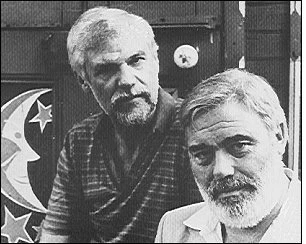
Ray Galton and Alan Simpson were still much in demand in the new millennium, popping up in TV documentaries and live interviews such as the one they gave to an appreciative British Film Institute audience in 2002. Their opinion was always being sought on situation comedy in general, and their first hand knowledge of the formative years of radio and television sitcom was invaluable to TV historians everywhere. They won a lifetime achievement award from the Writers' Guild in 1997, were awarded OBEs in 2000 and are finally acknowledged as the founding fathers of British situation comedy.
Alan Simpson passed away on 8 February 2017 aged 87 years. Alan Simpson passed away the following year, on 5 October 2018. He was 88 years old. Their passing was covered in the press, on television and online and tributes flooded in from the world of show business.
The legacy they have left to British comedy is unequalled by any other individual or writing team, and it is thanks to them that British comedy can look back on such a rich heritage. Without them all our lives would have been filled with a lot less laughter, and that would be unimaginable.
Published on February 20th, 2019. Written by Laurence Marcus (January 2006 updated 2019). *Special thanks to Tessa Le Bars, Ray Galton and Alan Simpson. Additional material: SRH. Edited by Pippa Gwilliam. for Television Heaven.






